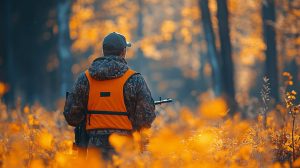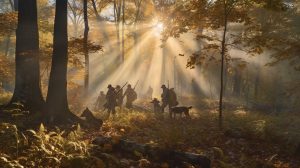Conservation and Hunting: Balancing the Ecosystem at Wadsworth Hunt Club
The interplay between conservation and hunting is critical in the sustainable management of ecosystems. This delicate balance allows for the preservation of biodiversity while simultaneously controlling the population of various species, preventing overpopulation that can potentially disrupt ecological harmony. On the other hand, hunting, when carried out responsibly and with conservation in mind, can contribute to the overall health and balance of ecosystems.
One organization that exemplifies these principles is the Wadsworth Hunt Club. A staple in its community, the club places a strong emphasis on responsible hunting practices and is deeply committed to conservation efforts. The club’s initiatives range from promoting ethical hunting behaviors to active participation in local conservation projects, underlining their role in spearheading sustainable hunting while contributing to their local ecosystem’s wellbeing. The balanced approach adopted by Wadsworth Hunt Club represents a model that other clubs and organizations can aspire to replicate.
Conservation at Wadsworth Hunt Club
Preservation of Habitat
- Land Management Practices
Wadsworth Hunt Club implements land management practices designed to support and sustain diverse habitats. They do this by controlling invasive species, fostering plant diversity, and maintaining landscape features that provide shelter and breeding grounds for wildlife.
- Wildlife Corridors and Sanctuaries
The club has also established wildlife corridors and sanctuaries in an effort to facilitate wildlife migration and provide safe spaces where animals can thrive without human interference.
Species Conservation
- Endangered Species Protection
Protection of endangered species is a priority for the club. They monitor local wildlife populations and work closely with conservation organizations to implement protection measures for species at risk of extinction.
- Restoring and Maintaining Healthy Populations
Beyond protection, Wadsworth Hunt Club is actively involved in restoring and maintaining healthy populations of local wildlife. They undertake initiatives such as controlled hunting and breeding programs aimed at keeping wildlife populations at sustainable levels, contributing to the overall biodiversity and health of their local ecosystem.
Hunting as a Conservation Tool
Population Control and Management
- Impact on Overpopulated Species
Hunting plays an instrumental role in managing wildlife populations by helping control overpopulated species. Overpopulation can lead to an imbalance in the ecosystem, causing food shortages and disease outbreaks. Wadsworth Hunt Club promotes regulated hunting, ensuring that animal populations remain in balance with their habitat.
- Preventing Habitat Degradation
Overpopulated species can cause considerable damage to their habitat, leading to degradation. Hunting helps to prevent this by keeping populations at sustainable levels, thereby reducing stress on habitat resources and preventing ecological damage.
Financial Contributions to Conservation
- Conservation Permits and Licenses
The Wadsworth Hunt Club generates revenue for conservation through the sale of hunting permits and licenses. These funds are then reinvested into conservation efforts, contributing to the protection and preservation of local ecosystems.
- Funding for Habitat Restoration Projects
Additionally, the club allocates a portion of its funding towards habitat restoration projects. This not only helps to repair habitats that have been damaged or degraded, but also creates more suitable environments for a wider range of species.
Balancing Conservation and Hunting
Sustainable Hunting Practices
- Bag Limits and Quotas
To ensure the sustainability of hunting practices, Wadsworth Hunt Club imposes bag limits and quotas on all hunters. These measures are carefully calibrated based on species, season, and population numbers. They help to prevent over-hunting, ensuring that animal populations remain healthy and sustainable.
- Selective Harvesting Techniques
Wadsworth Hunt Club also advocates for selective harvesting techniques. These techniques involve identifying and targeting older, post-reproductive individuals or those in surplus, thereby minimising the impact on the breeding population and contributing to the overall population’s health.
Education and Awareness
- Hunter Safety and Ethics
The club places a high priority on educating its members about hunter safety and ethics. They regularly conduct workshops and training programs to ensure that all hunters know how to handle their equipment safely, understand the importance of following hunting regulations, and respect the animals they hunt and the environment they inhabit.
- Public Outreach and Education Programs
Wadsworth Hunt Club also invests in public outreach and education programs. These initiatives aim to sensitize the public about the importance of conservation, the role of responsible hunting in ecosystem management, and the need for coexistence with wildlife. These programs are designed to foster a deeper understanding and respect for wildlife, encouraging the local community to become active participants in conservation efforts.
Conclusion
In conclusion, striking a balance between conservation and hunting is crucial for maintaining the health and diversity of ecosystems. Ethical and regulated hunting practices, exemplified by organizations like the Wadsworth Hunt Club, can not only help control wildlife populations but also generate funding for vital conservation initiatives. Wadsworth Hunt Club’s commitment to ecosystem management — through sustainable hunting, habitat preservation, species conservation, and public education — underscores their role as responsible stewards of the environment. Their model showcases how hunting and conservation can coexist harmoniously, laying a path for other organizations to follow, thereby ensuring a sustainable future for our world’s precious wildlife and their habitats.




